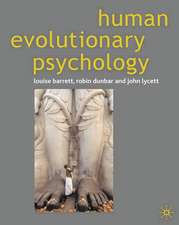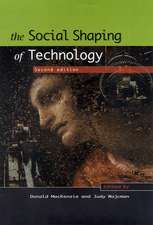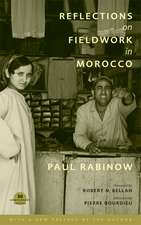The Emergence of Culture: The Evolution of a Uniquely Human Way of Life
Autor Philip Chaseen Limba Engleză Paperback – 27 oct 2010
In all species of mammals, there are codes (rules, concepts, values, etc.) that govern behavior. Among humans, and only among humans, some of these codes are created socially, through interactions among individuals. Human culture is thus an emergent phenomenon, one that cannot be understood without taking into account the interactions among individuals. Other species may learn codes socially, from their parents or other members of their species, but the codes are not created socially.
Because human society creates the culture that governs individual behavior, it can control individual members in a way that other primate societies cannot. Culture can facilitate cooperative and group activities, but can also lead individuals to behave contrary to their own evolutionary best interests.
This book describes the emergent nature of human culture. It proposes hypotheses to explain how a phenomenon that is potentially maladaptive for individuals could have evolved, and to explain why culture plays such a pervasive role in human life. It then reviews the primatological, fossil, and archaeological data to test these hypotheses.
| Toate formatele și edițiile | Preț | Express |
|---|---|---|
| Paperback (1) | 384.31 lei 6-8 săpt. | |
| Springer Us – 27 oct 2010 | 384.31 lei 6-8 săpt. | |
| Hardback (1) | 391.61 lei 6-8 săpt. | |
| Springer Us – mar 2006 | 391.61 lei 6-8 săpt. |
Preț: 384.31 lei
Nou
Puncte Express: 576
Preț estimativ în valută:
73.54€ • 76.78$ • 60.86£
73.54€ • 76.78$ • 60.86£
Carte tipărită la comandă
Livrare economică 05-19 aprilie
Preluare comenzi: 021 569.72.76
Specificații
ISBN-13: 9781441940285
ISBN-10: 1441940286
Pagini: 228
Ilustrații: X, 217 p.
Dimensiuni: 155 x 235 x 12 mm
Greutate: 0.33 kg
Ediția:Softcover reprint of hardcover 1st ed. 2006
Editura: Springer Us
Colecția Springer
Locul publicării:New York, NY, United States
ISBN-10: 1441940286
Pagini: 228
Ilustrații: X, 217 p.
Dimensiuni: 155 x 235 x 12 mm
Greutate: 0.33 kg
Ediția:Softcover reprint of hardcover 1st ed. 2006
Editura: Springer Us
Colecția Springer
Locul publicării:New York, NY, United States
Public țintă
Professional/practitionerCuprins
How is human culture different?.- Why does culture exist?.- The origins of socially constructed coding.- The elaboration of culture.- Conclusion.
Recenzii
From the reviews:
" The book by Philip Chase is a very original, thought-stimulating....and thanks to the authors's ability to explain complex subjects in simple words, his work may be interesting and useful reading not only for specialists...but also for everybody interested in general problems of human cultural and biological prehistory....this is a very important contributrion to the study of human culture, that deserves to be read by everybody who considers her(him)self an anthropologist."
PaleoAnthropology, 2006: 95-97
"This is a ... provocative volume about a very big topic – how humans are fundamentally unique in the way culture is generated and how the evolution of this adaptation occured. ... Chase provides readers with a thorough exposition of a view of culture that then serves as the basis for an evaluation of the development of human thought and action. ... This book will generate much stimulating discussion in advanced anthropology seminars." (Lynne A. Schepartz, Cambridge Archaeological Journal, Vol. 17 (1), 2007)
" The book by Philip Chase is a very original, thought-stimulating....and thanks to the authors's ability to explain complex subjects in simple words, his work may be interesting and useful reading not only for specialists...but also for everybody interested in general problems of human cultural and biological prehistory....this is a very important contributrion to the study of human culture, that deserves to be read by everybody who considers her(him)self an anthropologist."
PaleoAnthropology, 2006: 95-97
"This is a ... provocative volume about a very big topic – how humans are fundamentally unique in the way culture is generated and how the evolution of this adaptation occured. ... Chase provides readers with a thorough exposition of a view of culture that then serves as the basis for an evaluation of the development of human thought and action. ... This book will generate much stimulating discussion in advanced anthropology seminars." (Lynne A. Schepartz, Cambridge Archaeological Journal, Vol. 17 (1), 2007)
Textul de pe ultima copertă
Paleolithic archaeologists and human paleontologists have failed to address the origins of a phenomenon that is both absolutely central to the human way of life and unique to our species. In all species of mammals, there are codes (rules, concepts, values, etc.) that govern behavior. Among humans, and only among humans, some of these codes are created socially, through interactions among individuals. Other species may learn codes socially, from their parents or other members of their species, but the codes are not created socially. Human culture is thus an emergent phenomenon, one that cannot be understood without taking into account the interactions among individuals.
Because human society creates the culture that governs individual behavior, it can control individual members in a way that other primate societies cannot. Culture can facilitate cooperative and group activities, but can also lead individuals to behave contrary to their own evolutionary best interests. This book describes the emergent nature of human culture. It proposes hypotheses to explain how a phenomenon that is potentially maladaptive for individuals could have evolved, and to explain why culture plays such a pervasive role in human life. It then reviews the primatological, fossil, and archaeological data to test these hypotheses.
Because human society creates the culture that governs individual behavior, it can control individual members in a way that other primate societies cannot. Culture can facilitate cooperative and group activities, but can also lead individuals to behave contrary to their own evolutionary best interests. This book describes the emergent nature of human culture. It proposes hypotheses to explain how a phenomenon that is potentially maladaptive for individuals could have evolved, and to explain why culture plays such a pervasive role in human life. It then reviews the primatological, fossil, and archaeological data to test these hypotheses.
Caracteristici
Only current book based on the concept that human culture is a socially created, emergent phenomena Includes supplementary material: sn.pub/extras











